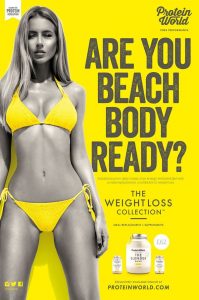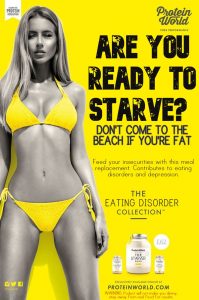Culture Jamming Assignment
Original Advertisement:

Original Ad Analysis:
Protein World, a British supplement company, released an advertising campaign in 2015 to promote their new weight loss protein powder as a meal replacement. The advertisement was plastered all over the UK featuring a very toned woman dressed in a scantily clad yellow bikini with the headline “Are You Beach Body Ready?” The bright yellow bikini along with the matching aggressive background immediately captures people’s attention. The tagline sets a confrontational tone reflected by the model’s pose to provoke consumers into comparing their appearance to an unattainable body representation. The model featured has a flat stomach, thin waist, large chest, a thigh gap and skinny arms with no visible imperfections, which represents media’s portrayal of the perfect, ideal body type. This visual coupled with the headline suggests that women are required to attain this body type in order to show themselves in a public area such as the beach. The campaign is targeted towards a younger, impressionable demographic that strives to maintain social acceptance. Companies such as Protein World rely on the tactic that insecurity sells to promote harmful, food-restricting products by reinforcing the society derived notion of how a female body should look. This brand presents a misleading idea that anything outside the realm of skinny and flawless is not considered beautiful or worthy of exposing. This idea particularly becomes problematic in conjunction with the labels stating that “substituting two daily meals of an energy restricted diet with a meal replacement, contributes to weight loss,” which inaccurately promotes unhealthy means of dieting in order to achieve a physical appearance equivalent to an air-brushed version of a perfect woman.
Jammed Advertisement:

Jammed Ad Analysis:
My jammed advertisement aims to represent the absurdity of the original advertisement by changing the main headline to the subliminal message this product is expressing: “Are You Ready to Starve? Don’t come to the beach if you’re fat.” Protein World has created a harmful representation of media driven body image and beauty standards. A significant element to the problem this advertisement highlights is the diet culture our society is surrounded by. Due to media pushing unrealistic images of beauty ideals, people are resorting to diets and quick fix weight loss products such as Protein World’s “The Slender” as the solution. In reality these supplements could potentially create the opposite desired effects as weight is a finicky subject with several different factors influencing its fluctuation. For example, when an individual using this type of product begins to consume food, the body may overcompensate the restoration of fat cells to reach it’s normal levels, which in turn could lead to a weight gain. Weight loss or gain is more complicated than just the amount of food consumed as each person’s body is uniquely built and responds differently. Therefore, it is important to follow custom workout and meal plans catered to your body type in order to reach a fitness goal instead of becoming reliant on products and messages that encourage starvation practices. Without having the knowledge required to reach a fitness goal, it is easy for impressionable women with the desire to meet a society driven standard of body image to fall into the trap of believing a product showcasing a toned, air-brushed woman will lead to weight loss and social acceptance. This provides a perfect avenue for companies such as Protein World to exploit women’s insecurities which I attempted to emphasize by replacing the original statement of meal substitutions to “feed your insecurities with this meal replacement.” The frustration and shame of not having the body type represented in the ad can lead to significant mental health ramifications. It is crucial to redefine the standards of beauty to represent all body types. With this new ad, I wanted to stress that following these harmful instructions of meal replacements will have severe consequences by stating the product “contributes to eating disorders and depression” as opposed to the original statement that the product “contributes to weight loss.” By subverting the original advertisement’s attempt to sell a harmful product by using an ‘insecurity sells’ tactic, I am hoping that my new jammed advertisement expresses the importance of putting a stop to body shaming.